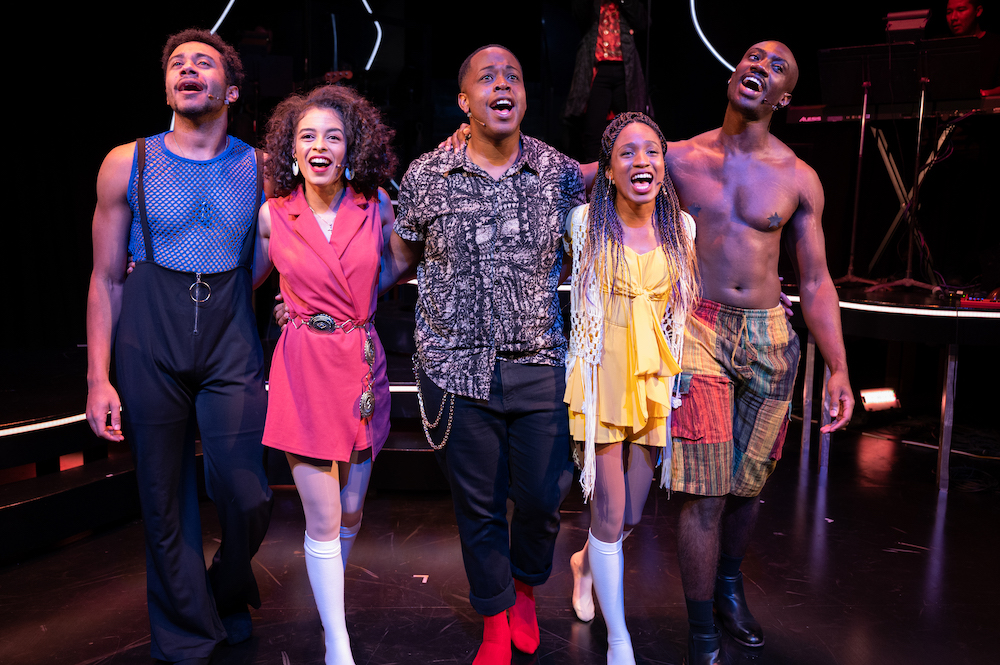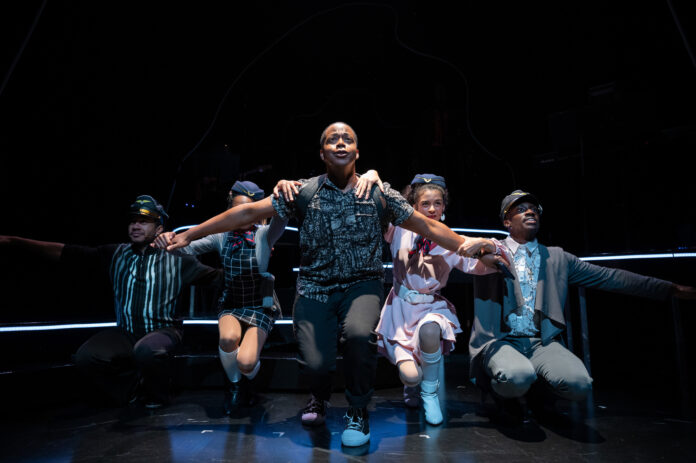Even if lauded performer Colman Domingo hadn’t been part of this show’s original, legendary runs at the Berkeley Rep and on Broadway more than a decade ago, I still would have gone into this production—my second Domingo-related show of the weekend, after Dot at NCTC—with skewed expectations. I freely admit that Passing Strange (through April 10 at Ashby Stage) is not only my favorite musical, but my favorite piece of theatre. I can’t recall any other show that seemed so directly tuned to my personal definition of Blackness and familial relationships. One of my great regrets was not being able to see the aforementioned Berkeley Rep run, back in 2007.
What I’m getting at is that my standards for this show are very high, even without Domingo along for the ride this time around. I knew that Shotgun Players (which was checking for COVID vaccines, but not boosters—masks at all times—at the time of my visit) wouldn’t be catering their production to those specific expectations, but there are still a number of choices by director William Hodgson that made me tilt my head. When a show that typically runs just over two hours, including intermission, gets stretched out to nearly three, it can’t help but come off as a lack of faith in the material.
Our story, as told by our omnipresent narrator (Albert Hodge), takes us to South Central Los Angeles in 1976. The height of the Civil Rights Movement has passed and, despite continued economic disparity and a crippling gas crisis, there’s a greater Black presence in American suburbia. It is there where we find the joyful single Mother (Rolanda D. Bell) of the disaffected Youth (Devin Cunningham), who is trying to define himself in a world where his Blackness has been defined by everyone around him, but not he himself. Despite not being taken in by his mother’s Christian faith, a church service epiphany unlocks his artistic ambition, something he feels he can’t explore in his current location. Without so much as a “good-bye,” he sets off to Europe to create art and find a chosen family, leaving his other one behind.
The necessity of a show like Passing Strange can’t be understated. It doesn’t carry the reputation of a show like Raisin in the Sun, Dreamgirls, or even Once on This Island (created by white artists), but a Black American coming-of-age story—specifically, a roman à clef by co-creator Stew—is one often untold in the Great American lexicon. Like Alison Bechdel’s Fun Home (also made into a musical) and Phoebe Gloeckner’s The Diary of a Teenage Girl, Passing Strange is a welcome break from all the “young white boy finds himself” stories that dominate every corner of pop culture. As entertaining as it is revelatory, it’s a powerful musical spotlight on, as Keith Knight would say, “that one Black kid.”
What’s more, the specific use of an all-Black cast to represent the Youth’s neighbors and his eclectic (and eccentric) European friends is itself a subtle commentary on seeing the world through the eyes of someone Black: Our stories are rarely told because they supposedly lack appeal, but they’re as universal as any by Shakespeare. James Baldwin famously told Life magazine in 1963: “You think your pain and your heartbreak are unprecedented in the history of the world, but then you read.” For a Black character like the Youth to see how his experiences compare and contrast with those of foreigners is as important for Black audiences as for white ones.
Unfortunately, the still-powerful music and text can’t save Shotgun’s production from a series of stumbles that probably seemed like good ideas at the time. The first is the set by Romello Huins. Resembling a piece of layered paper art, the all-black void is broken up by LED-lit borders. It’s an interesting design, however the cast rarely take full use of it. One level is dedicated solely to the talented band, so the actors often perform on level below it. This can often make choreography seem cramped and limited.

Also striking are the costumes by Jasmine Milan Williams, a talented performer in her own right. They’re a move away from the basic blacks of past productions, but don’t always fit the transitions of the ensemble. The original basic blacks were a necessity for a cast that changes characters every few minutes. The costumes here are stylish, but very specific.
Then there’s Hodgson’s questionable choice of having the cast perform some songs at half-energy. One could tell the volume suffered from tech SNAFUs on opening night, but when the mid-song “whoo!” of “Amsterdam” can’t be heard from blocks away, then it’s not powerful enough. Furthermore, cast entrances and exits are all limited to “step on, step off, repeat,” which becomes redundant very quickly. To top it all off, adding more “air” between lines to make the show longer was a mistake.
Help us save local journalism!
Every tax-deductible donation helps us grow to cover the issues that mean the most to our community. Become a 48 Hills Hero and support the only daily progressive news source in the Bay Area.
Having said that, the cast bring their many characters to electric life and the band does the same with the music. Rolanda D. Bell and Devin Cunningham perfectly nail the respective complexities, ambitions, and regrets of Mother and Youth, respectively—they are both funny and real in a way that makes the ending all the more tragic. Ensemble members Angel Adedokun and Chanel Tilghman, the latter a regular at Berkeley Playhouse, clearly have fun with their multiple personae, transitioning from ingenue to femme fatale to militant iconoclast with greatest of ease. Albert Hodge brings both the pipes and presence to the Narrator, but Shakur Tolliver—whose work I’m not familiar with—seems to have been given the direction of “go big” with no other notes.
As text and music, Passing Strange is both thrilling entertainment and a welcome reprieve from the abundance of white-washed narratives. Still, this production suffers a series of directorial choices that fail to reach the operatic heights of the material performed. In fact, those choices seem to go in the opposite direction, toning down a lot of the power that crackles through every line and note.
That’s a shame. The last thing this show needs is to be toned down. Or nearly three hours long.
PASSING STRANGE runs through April 10 at the Ashby Stage, Berkeley. Tickets and information here.





